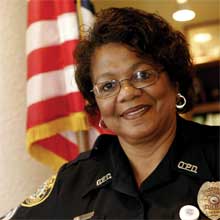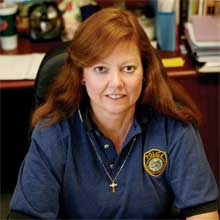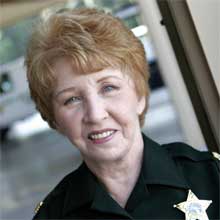


By JoAnn Guidry • Photos By Caroline Johnson
There is no doubt that women have indeed come a long way, baby, since the women’s liberation movement of the seventies. There is hardly a profession that was once dominated by men in which women haven’t made inroads, some more deeply than others. Women have overcome prejudices, broken through the glass ceiling, and trespassed into territory previously belonging exclusively to men. Women are now lawyers, scientists, astronauts, firefighters, jet pilots, sports writers, racecar drivers, politicians, and yes, police officers.
In the latter field of law enforcement, Ocala/Marion County has its own trailblazers. The Ocala Police Department currently has 24 female officers out of 153 sworn officers; of that former number there is one captain and three sergeants. The Marion County Sheriff’s Office has 175 sworn deputies and 41 of those are women. Women supervising officers with the MCSO include one major, two captains, three lieutenants, and one sergeant.
In this exclusive Ocala Style series, we visited with a quartet of women who have taken the road less traveled. In Part I, we profile three women who paved the way with OPD and MCSO. In Part II, we experience a ride-along with a young MCSO sheriff’s deputy.
Corporal Ella Daniels
Ocala Police Department/ Crime Prevention Officer
On the way to fulfilling her dream to work with at-risk children, Corporal Ella Daniels became the first black female patrol officer with the Ocala Police Department. It wasn’t what she’d planned; she was hardly into women’s liberation. Now 24 years later, Corporal Ella Daniels can look back on a career she stepped into with no regrets and a good deal of pride.
“I was divorced and a single mother,” she recalls. “I needed to find a way to make a living. But I wanted to do something that would make a difference, particularly with children. I always wanted to be some kind of counselor.”
Ocala native Daniels attended Central Florida Community College for two years, majoring in criminal justice. After moving to Columbus, Georgia, to live with a sister, she continued her studies at Columbus College and graduated in 1981 with a degree in criminal justice. Back in Ocala, she applied for a position with the OPD.
Make that tried to apply.
“They wouldn’t even give me an application,” she says. “There were a couple of female officers and there were also two black male officers then. But there were no black female officers.”
That was about to change. Through a friend, Alvis Summers, who worked as an OPD evidence tech, Daniels was finally able to obtain an application. It was just the opportunity that Daniels needed.
Her first OPD position was in the communications department as a dispatcher. After three months of confinement, she was ready for more and entered the CFCC Police Training Recruit School. By the 1982 Fourth of July weekend, Daniels was in a patrol car.
“I’ll admit it was very scary being out there alone,” she says honestly. “There was a lot of pressure. My zone was in the west part of town, the black part of town. I knew a lot of people in that area, which was both a good thing and a bad thing. The bad part of it was that my fellow officers didn’t know if they could trust me.”
Daniels realized that even if she was the closest unit, her fellow officers wouldn’t request her as backup.
“I finally confronted another officer, a white male officer about the situation,” she says. “He told me that the problem was that I was a female, I was black, and since I was from the zone we covered, they didn’t know if I would carry out my duties as a police officer.
“I set him straight right away,” she continues. “I told him my first responsibility was my safety and my fellow officers’ safety in doing my job, and that there would be no favoritism shown toward any friends or family I had in the area. Things slowly got better after we had that little talk.”
In her eight years as a patrol officer, Daniels never had to fire her weapon. Her no-nonsense demeanor and gift of gab got her out of many tight situations. It also led to her becoming a hostage negotiator.
“I always preferred to use talk to diffuse a potentially dangerous situation,” she says. “But I didn’t hesitate to get physical if I had to and people came to understand and respect that.”
In 1990, Daniels moved on to the OPD Crime Prevention division. And through myriad youth programs like D.A.R.E. and G.R.E.A.T., aimed at drug and gang resistance education, respectively, she has made an impact on the youth of Ocala. She also serves on numerous community boards including Arnett House, Interfaith Emergency Services, and the Marion County Prevention Association.
When her shift is over at the OPD Crime Prevention office in the Paddock Mall, Daniels’ day is hardly over. There is always a meeting of some kind in the evenings and a youth program field trip on the weekends.
“It’s been pretty much a 24/7 job for me these past twenty years,” says Daniels, “but I wouldn’t change a thing about it. I think things are better now for women police officers. But my best reward is seeing some kid years later and that they’re doing well.”
Daniels, 57, is planning to retire in 2007 after 25 years of service. The first six months of retirement she intends to fill with an Alaskan cruise and a cross-country train trip. After that, she’s pretty sure she’ll get antsy and will remain involved in community volunteer work. Good news for the children of Ocala.
Captain Robin Ford
Ocala Police Department/ Professional Standards Division
Lining the front of Captain Robin Ford’s desk is a miniature Zen rock garden, two bowls of soothing stones, and a mini-waterfall. It’s Ford’s acknowledgement that being a cop, both genders, is a stressful job. But the relaxation-inducing items are not for Ford, they’re for the visitors to her office in the Professional Standards Division of the Ocala Police Department. This is the department that polices the police.
“As you can imagine, when people come to this office they’re under a lot of stress,” says Ford, 45, who is the highest-ranking female officer with OPD. “If we can get people to relax a little, it’s better for everyone. When there is an issue with a police officer, we investigate, and then give the facts to the Disposition Panel that makes the final determination in the case.”
The job is not suited to everyone, but Ford thinks her 20 years of experience — and her personality — made her a good candidate for the position.
“I’ve worked in just about every division, from patrol to training to crime prevention to investigations, so there’s not much I haven’t experienced,” she says. “I really like the investigative part of the job and I’m good at it. I’m also good at being emotionally detached and just sticking with the facts. And probably in this job, it helps to be a little bit of a cynic, too.”
Ford becoming a police officer may have also been predestined. Growing up in Miami, both her father and her step-father were cops.
“It was a very strict, regimented upbringing,” she says. And perhaps in rebellion to that, she majored in liberal arts at Miami/Dade Community College and became a teaching assistant in the county school system.
But the cop thing didn’t go away and Ford finally gave in to it. Accepted by the Hallandale Police Department, she attended the Police Academy at Broward Community College. Upon graduation, she became a patrol officer from 1985 to 1990.
“It was a tough area to be a patrol officer, especially a female patrol officer,” she recalls. “But if you’re going to be a cop, that’s how you start.”
It was during this time that Ford had her toughest experience as a patrol officer.
“There was a baby that was suffering from shaken-baby syndrome,” she recounts, “and I stayed with her until she died. That was very difficult.”
Not surprisingly, Ford also married a fellow police officer in 1989. When they decided to move out of the Miami area, it was to Ocala. Not necessarily because of the police work opportunities but because of the horse industry. A lifelong horsewoman, Ford wanted to be in an area that was conducive to the equine lifestyle. Ocala definitely fit the bill and shortly after the move in 1990, both she and her husband, Rich Lohbauer, were working, he with the Marion County Sheriff’s Office and she with OPD. Lohbauer is currently a master deputy and head of the MCSO Bomb Squad.
Ford was an OPD patrol officer, along with a half a dozen other female officers who were also on the road at that time.
“I definitely felt more accepted here in Ocala,” she says. “We had a great squad headed by now-retired Sgt. Ken Hall. He was the one who taught me how to talk with people rather than fight with them in a tough situation.”
After two years on the road, Ford’s career took a different turn in 1992 as she began “driving a desk instead of a car.” She became a detective, working in Property Crimes, Major Crimes, and Sexual Crimes. In 1995, she became a sergeant and moved into Crime Prevention. A year later, she was promoted to a lieutenant and was instrumental in the training of the OPD Mounted Unit.
There was a two-year stint in the Resource Development, where Ford was responsible for the training programs for all OPD personnel. In 1999, she became the first female officer promoted to captain and moved to the Criminal Investigation Division.
“That was probably my favorite position,” she admits. “I just loved being a detective.”
But when you’re moving up the ladder, there’s always another rung. In 2003, Ford became the Patrol Commander for District One before landing in her current post in 2004.
“My supervisors call it having a well-rounded career,” says Ford, who has a Master’s in Criminology.
Ford will not deny that she has ambitions in her male-dominated field.
“I would like to become a major,” she says. “There’s never been a female officer in OPD who became a major. I would like to be the first.”
But despite that lofty goal, Ford also knows how to leave the job behind when she goes home. She and 10-year-old daughter Sara share a passion for horses, spending their time together training and showing.
“The horses are how I de-stress,” she says.
For everybody else, there’s the miniature Zen garden on her desk.
Major Patti Lumpkin
Marion County Sheriff’s Office/Youth & Community Service Bureau
Major Patti Lumpkin’s 30-year career of firsts with the Marion County Sheriff’s Office began with a newspaper article.
“The sheriff’s office was looking for women interested in becoming part of a women’s volunteer auxiliary group,” recalls Lumpkin, who grew up just north of Ocala in Anthony. “I thought that sounded interesting, so I went to the meeting. It was 1974 and there weren’t any women with the sheriff’s office. What they needed were women to help with the female inmates.”
Lumpkin did indeed become part of that auxiliary women’s group and instantly liked the law enforcement work. Within a year, she was a fulltime secretary in the Criminal Investigations Division. By the end of 1975, she had graduated from the Officer Recruit Academy at Central Florida Community College and became the first female patrol deputy. It would be but the firsts of many more opportunities to come for Lumpkin.
Today, Lumpkin is the bureau chief of the MCSO Youth & Community Service Bureau. She supervises 30 fulltime employees, 22 deputies, and 1,500 volunteers. Under her watch are programs such as D.A.R.E., Crisis Intervention, Internet Crimes, Victims Advocate, and Seniors At Risk.
Of her years as a patrol deputy, Lumpkin says, “I definitely had to prove that I could do the job and take care of myself with my fellow deputies. Actually, they came around quicker than the public did when it came to accepting a woman in a job people thought should be just for men.”
After five years on the road, Lumpkin became the first female detective with MCSO Criminal Investigation Division. This led to some of her most memorable work with the Drug Unit — undercover drug work. What needs to be pointed out here is that Lumpkin is a petite, five-three, blue-eyed, strawberry blond. Not exactly Hollywood casting for an undercover drug detective. But she was very good at playing the part, including a significant role in numerous drug operations.
“The drug business is just that, a business,” explains Lumpkin. “The number one thing with the drug dealers is their greed. It will blind them and you use that to your advantage.”
Lumpkin’s undercover work was also her most dangerous, once getting caught in a shootout between rival drug dealers. Yet she never fired her weapon.
“You learn to talk yourself into situations and then talk yourself out of them,” says Lumpkin, who not surprisingly later became the first female deputy hostage/crisis negotiator.
More firsts followed: 1987 — first female sergeant and supervised the Drug Task Force; 1993 — first female lieutenant serving as head of the Major Crimes Unit; 1996 — first female captain while becoming the supervisor of the Detective Bureau; 1998 — first female major; 1999 — first MCSO female deputy to be invited to the FBI Command School for Officers; 2000 — first female bureau chief.
When Lumpkin achieved the latter, the Youth & Community Services Bureau had just been formed.
“I asked Sheriff [Ed] Dean what was the directive of the bureau,” she says. “He told me to write the book. Five years later, we’re still evolving as the community’s needs grow.”
In her career of more than three decades, Lumpkin has seen many changes in the community and in its perception of law enforcement.
“I think it’s definitely much less an adversarial situation,” she points out. “Law enforcement is much more proactive and a lot less reactive. We’ve much better integrated into the community now than when I became a deputy. I see that relationship only getting better every day.”
Retirement looms for 63-year-old Lumpkin, but it’s still four years away.
“I have no regrets,” she says. “I’ve had and continue to have such a rewarding career. I’ve made friendships and had experiences that no amount of money could buy. I wouldn’t trade a minute of it.”
But Lumpkin still has ambitions, too. The only rank higher than major is chief of staff, which is just below the sheriff in the MCSO hierarchy. “It would be a nice way to wrap up my career,” she says.
And, yes, it would be another first to add to her long, long list.






